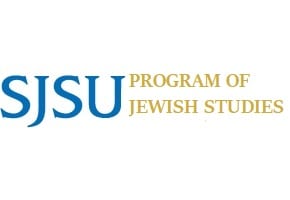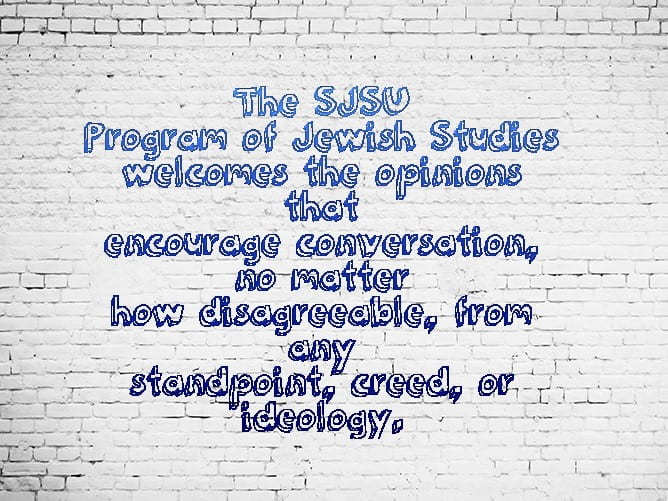The issue of the Israel-Palestine conflict on US university campuses has had a way lately of attracting extremists who prey on the common courtesy of common ignorance, smug self-righteousness, or pasty-faced cowardice to appear justifiably irate and just and humane.
“Zionism” is fodder for extremists who cannot (nor do they want or care to) distinguish Zionism from Jewish culture, which, perhaps in some random superficial sense, does not seem all that disconcerting, but especially on campuses where social activism is a large part of student life, it is difficult for students to identify with Jewish culture.
The obvious implication here is that Jews and Zionism have something in common. Would you agree? If not, then it must be stated unambiguously:
The SJSU Program of Jewish Studies does not discriminate on the subject of Zionism, non-Zionism, neo-Zionism, post-Zionism, or anti-Zionism. Any ideological strain may be supported, considered, debated, repudiated. Any member of the academic institution in question is not only entitled to an opinion but should have the freedom to express it accordingly and appropriately. The key point here is free, open conversation about Zionism.
Anyone affiliated with the public university should be allowed to choose, endorse, prefer, emphasize, decline, criticize, assail, or be entirely indifferent toward any public issue, including Zionism. No opinion, ideology, or religious belief, is foolproof to the human mind. Everyone is accorded the same freedom of speech, assembly, and press, – the hallmark of the free, open, multicultural, pluralistic, liberal, democratic society.
The only time when this freedom does not apply to everyone is in the case of public safety. It would then fall on the particular institution in the particular case to make this underlying intention clear.
Not making the intention clear, when the free expression of opinion is curtailed, targets any number of people on campus who may suppose virtually any point on the subject of Zionism and may be shunned, harassed, or verbally abused for no reason other than existing. All in all, in the name of social justice, of course!
Just as scandalous is when the administrative faculty is too busy, too uncertain, too lazy, too ignorant, too unwilling, or, all combined, to care an iota for the issue. “Jews cry wolf, again,” he/she would say with smug self-righteousness and chin raised up high. Somehow, to think an university professor drank the cool-aid or is all in on it, is too simple. It is quite another to show an institution of the university had been taken over by extremists – yes, “taken over,” as in, strategically, to further the extremist point of view, – for how else is power thereby exercised by repeatedly ignoring and then consistently blocking (when ignoring is not possible) the same dissenting point of view from making a debut within the same institution?
What one may find is that administrative carelessness as such when it is too easily manipulated is simple, even banal, carelessness. Not quite the “banality” in Eichmann in Jerusalem, but one that is still intriguing: The (“too easily manipulated”) professor in charge, or the institution at large, is not willing to educate precisely when it is pivotal, when uneducated social activism is extremism!
The field of Jewish Studies exists precisely on account of public education in multicultural society. As an academic program, Jewish Studies depends on open, unprejudiced, relentless conversation on Zionism or Israel or “everything done under the sun” (Ecclesiastes 1:14).

